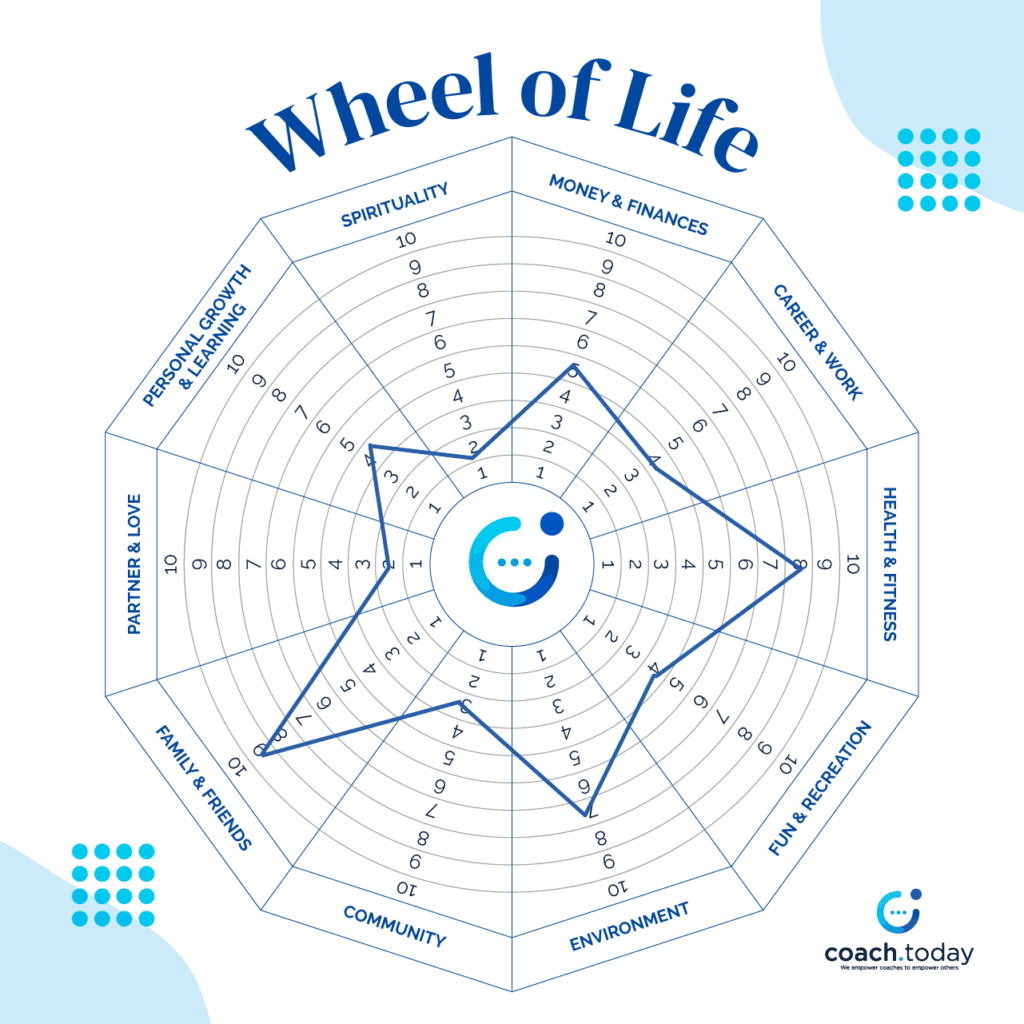Introduction
The “Wheel of Life” is an effective tool that separates areas of life by a wide array of categories such as Business/Career, Romance, Physical Environment and more. It then ranks them based on how proficient your client is in each area. To get started, have your client assign each category a number from 1 – 10 based on where they feel they are. Then have them draw lines like the graph shown below.

Background
The history of the wheel goes back to the 1960s. It was invented by Paul Meyer who is considered to be a pioneer in the self-improvement industry. He is known for creating life coaching techniques that many use to this day. He also founded the organization called “Motivating People to their Full Potential” which earned him the reputation he has today. It was created to help people realize their goal and is known by many names including the, “Life of Balance Wheel” and was based on the most common topics that a coach goes over with their clients. The wheel has 8 sections based on what are considered the most important aspects of an individual’s life. It dives into their professional, personal, romantic life and more. The sections include:
Career and Work
What is your client doing right now as a career? Do they feel satisfied in their position? What more can they do to level up and is it something that they want to pursue?
Family and Friends
What are their friends like? How do they feel being around them? Do the friends bring them up or do they pull them down?
Environment
Determine whether your client’s environment is sound for their personal growth. What is their home or work setting like? Do they feel satisfied? Is there anything that needs improvement?
Fun and Recreation
Does your client have any spare time for recreation in their life, and do they want to make more time for fun and recreation?
Personal Growth and Learning
Your client focuses on doing activities that help develop their personality and potential growth. These can be in the form of reading, watching informational videos, or spirituality.
Partner and Love
Does your client have a partner? Are they in search of fulfillment through meeting with one? If they have a partner, do they feel fulfilled?
Money and Finances
What is their financial situation like? Do they need more money to resolve their issues? Is there anything financially related that is causing them stress such as mortgage payments, student loans, etc.?
Health and Fitness
What is your client’s current condition? Do they feel satisfied with their health, or do they wish they could be better in other aspects? Is there a condition that does not let them live the life they want? Are there any problems related to weight gain?
Spirituality
Do your clients have any beliefs or religion that they adhere to? Do they practice spirituality on a consistent basis or do they need more of it? If they follow through, does it satisfy their life?
Community
Figure out how they interact with the community. How is the client’s relationship with their spouse, their coworkers, and their friends? Do they feel that they belong, or do they feel ostracized to an extent? Do they join any community sessions as well?
There is no specific order to go through the wheel and many life coaches prioritize one section over another. After they have assigned a score to each category, you then want to draw a spider web diagram that looks something like this:

This is an example of the wheel of life coaching with a scoring system for each category
Now what you want to do, is draw a line through the score of each section and connect the dots. Your finished result should look like a spider diagram. This will make it easier to visualize the areas of life your client needs help in. Make sure you have an action plan set in motion to be ready to help your client.
When Should you use the Wheel of Life
You should use the wheel of life as part of an assessment test to see what your client needs help on. If you read our previous article on picking your niche, then you know that tackling a wide array of problems at once is not very convenient. The wheel of life would make it easier to weed out clients whom you might not be compatible with.
Conclusion
The wheel of life is a great tool to use to examine the weak spots of a client that might otherwise go unnoticed. It is great at filtering out problems from the get go and is a must-have for any life coach who wants to excel at what they do. We hope you found this article useful. If you need any more coaching tips, be sure to visit coach.today/blog.




